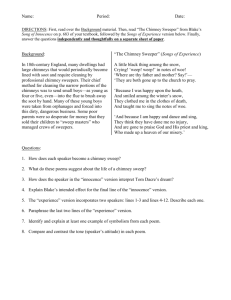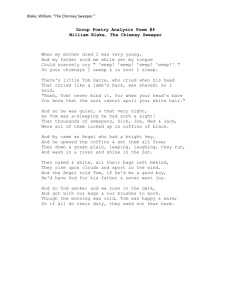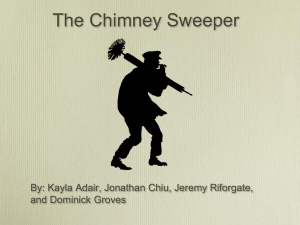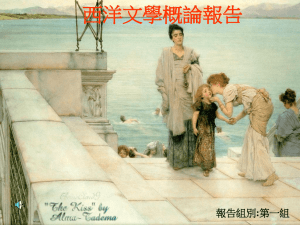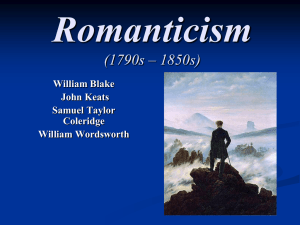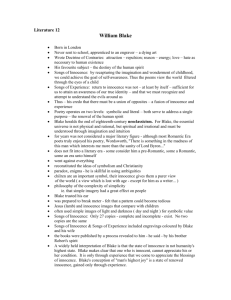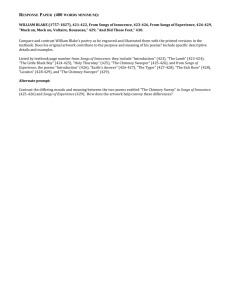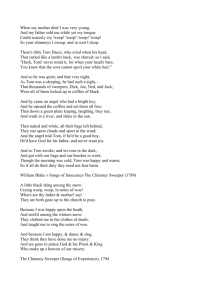Romantic poetry: William Blake
advertisement
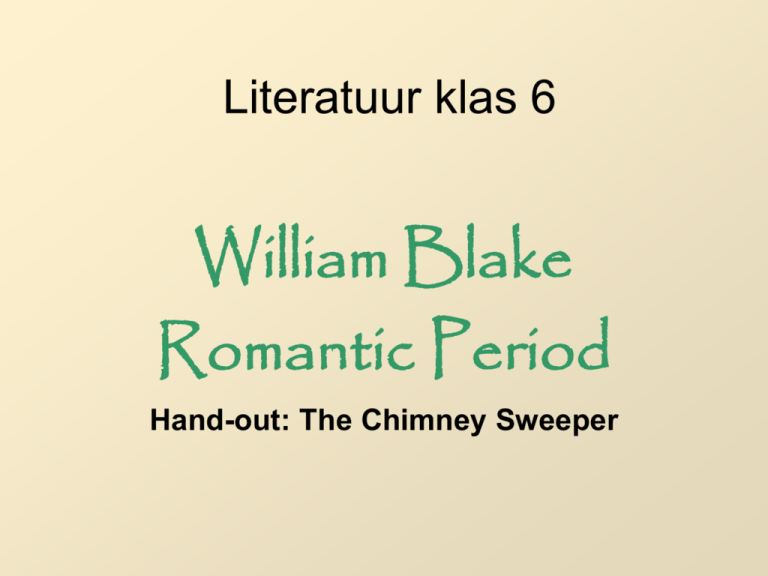
Literatuur klas 6 William Blake Romantic Period Hand-out: The Chimney Sweeper Romantic poetry: William Blake (1757-1827) Contents: • Briefly: Romanticism • William Blake’s life • Discussion of two poems: “The Chimney Sweeper” I’ll tell you when to make notes! Remember: To fully understand and appreciate literature, you should always know the context of the writer and the society he or she lives in. William Blake’s life - Brilliant poet, but only recognized after his death Lived mostly in poverty Could hardly get published Poetry + engravings: few copies sold Idealist: opposed materialism of Industrial Revolution - Imagination superior - Esp. Opposed to child labour Continued… William Blake’s life - Misunderstood and derided - Thought to be immoral and seditious - Borderline madness, visions William Blake’s life make notes Summarizing: - He was a fine visionary poet and engraver - Idealistic, esp. about social issues concerning Industrial Revolution - He was a bit of a nutter - He was ridiculed by most - Huge recognition after his death William Blake’s work make notes His most renowned bundle of poetry and engravings is called: “Songs of Innocence and Experience” In these poems, the world is seen through a child’s eyes. “Songs of Innocence and Experience” The Songs of Innocence are full of love, hope, faith, and goodness. The Songs of Experience are full of disillusion, bitterness, evil and gloom. make notes The Chimney Sweeper Little boys, sometimes only six or seven years old, were used as chimney sweepers. Many of them choked to death. They would collect soot in bags. Blake wrote two poems by this name: one in Songs of Innocence, one in Songs of Experience. The Chimney Sweeper When my mother died I was very young, And my father sold me while yet my tongue Could scarcely cry " 'weep! 'weep! 'weep! 'weep!" So your chimneys I sweep, and in soot I sleep. There's little Tom Dacre, who cried when his head, That curl'd like a lamb's back, was shav'd, so I said "Hush, Tom! never mind it, for when your head's bare You know that the soot cannot spoil your white hair.“ And so he was quiet, and that very night As Tom was a-sleeping, he had such a sight! That thousands of sweepers, Dick, Joe, Ned, and Jack, Were all of them lock'd up in coffins of black. Continued… And by came an Angel who had a bright key, And he open'd the coffins and set them all free; Then down a green plain leaping, laughing, they run, And wash in a river, and shine in the sun. Then naked and white, all their bags left behind, They rise upon clouds and sport in the wind; And the Angel told Tom, if he'd be a good boy, He'd have God for his father, and never want joy. And so Tom awoke, and we rose in the dark, And got with our bags and our brushes to work. Though the morning was cold, Tom was happy and warm; So if all do their duty they need not fear harm. Analyse this make notes Who is the speaker? A little boy, because boys were used as chimney sweepers, not girls. He’s little, otherwise he couldn’t do the job (line 4). Analyse this make notes What is the speaker like? A boy who doesn’t lose heart (“never mind it”, “if all do their duty…”), despite his background (“when …tongue”) and working conditions (“morning was cold”, “in soot I sleep”). He finds strength in his faith (refers to Angel, having God for your father). Analyse this Why is this poem Romantic? Escape from visual reality: dreamworld, imagination, innocence of a child. make notes Analyse this make notes Can you find strong images or metaphors? - Coffins of black Lamb’s back Rise upon clouds Key Naked chimney innocence heaven help free from working stuf Analyse this What can you say about the use of the colours white and black? First, look for the colours in the poem. White: lamb, naked and white, white hair, wash, clouds. Black: chimneys, soot, coffins, we rose in the dark. make notes Analyse this make notes What can you say about the use of the colours white and black? Black and white are contrasting colours. Always look for contrasts! White stands for innocence; black for the loss of innocence. Analyse this make notes What can you say about the tone of the poem? You have a poet, who lets a child do the talking. You know the poet is opposed to child labour. The last line could be read as ironic. The poet doesn’t agree with the child at all! The Chimney Sweeper A little black thing among the snow, Crying "weep! 'weep!" in notes of woe! "Where are thy father and mother? say?" "They are both gone up to the church to pray. Because I was happy upon the heath, And smil'd among the winter's snow, They clothed me in the clothes of death, And taught me to sing the notes of woe. And because I am happy and dance and sing, They think they have done me no injury, And are gone to praise God and his Priest and King, Who make up a heaven of our misery." Analyse this Who is the speaker? Again, a little boy. make notes Analyse this make notes What is the speaker like? A sad boy, crying in ‘notes of woe’ (l.2); disillusioned with his parents (because he was happy, they clothed him in the clothes of death, and ‘they think they have done me no injury’); he’s also lost his faith in the Church (‘who make up a heaven of our misery). Analyse this make notes Can you find strong images or metaphors? - Little black thing soot - Clothes of death working clothes, this work often led to death - Sing the notes of woe being unhappy - Snow happiness Analyse this make notes Again, the colours white and black are used to contrast innocence and loss of innocence, happiness and unhappiness. Analyse this make notes What can you say about the tone of the poem? The speaker is a little infant, who is able to reflect upon his own life. He sounds like an adult! this is again an illustration of the loss of innocence. Analyse this make notes Why is the first poem part of ‘The Songs of Innocence’, and the second of ‘The Songs of Experience’? This could be a question on your test. Think about it! Some final thoughts… Blake wasn’t a truly Romantic poet, although the Songs of Innocence have the most Romantic elements. When Romanticism came to an end, Blake became more popular. He was simply ahead of his time in originality and complexity. In these poems, he seems anti-religious, but in fact he was a religious man. Yet he didn’t appreciate everything the Church claimed. Things to remember • The mood of the Romantic Period • Key facts about William Blake • The analysis of both ‘The Chimney Sweeper’ poems. Romantic poetry: William Blake (1757-1827)
